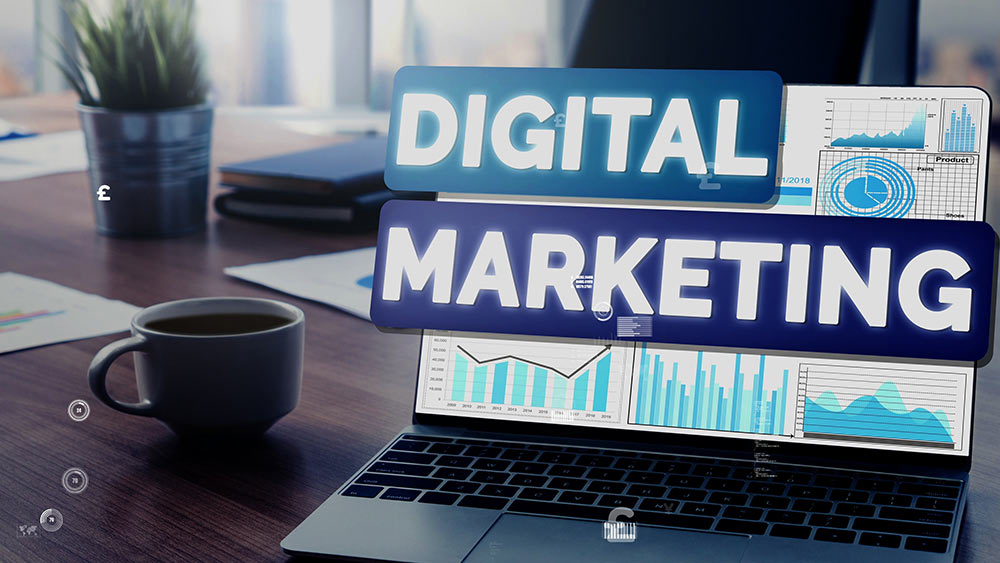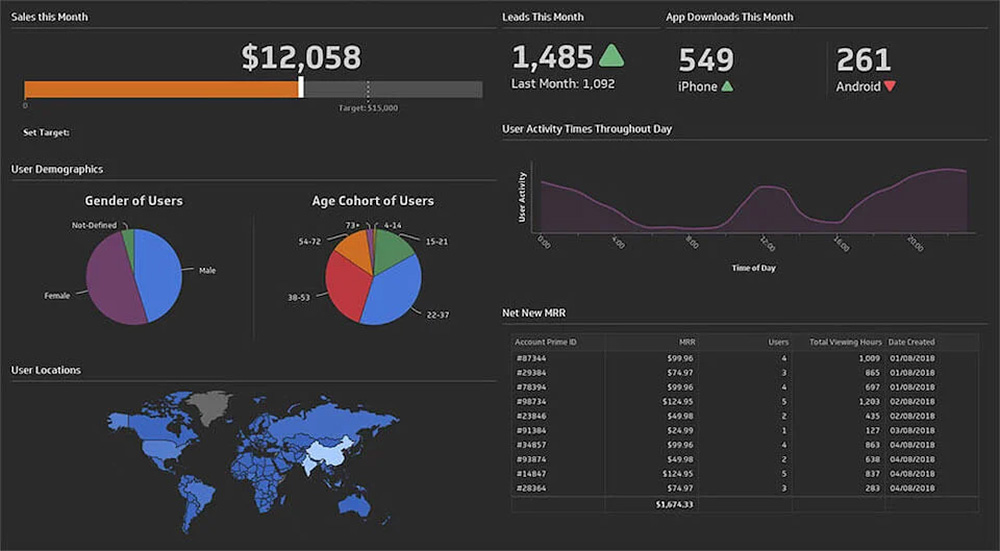9-Step Easy Guide For Digital Marketing Plans
Since the early days of the internet, digital marketing has become increasingly sophisticated. Businesses rarely developed a digital marketing strategy back then. Those who did concentrate primarily on websites, banner ads, and email marketing.
You can now choose from dozens of digital marketing channels and platforms. Should you prioritise SEO or PPC for your digital marketing campaigns? Webinars or blogging? Email or social media? Video marketing or podcasts? Which is better, augmented reality (AR) or virtual reality (VR)? What should you pay, and when should you expect to see results? Trying to find the best solutions for your brand can be difficult, if not overwhelming.
This then brings us to our topic today:

Digital Marketing Plan
A well-defined plan assists you in determining the most effective digital marketing techniques for your company and then putting those plans into action. A digital marketing plan helps you structure your endeavours so that you are always communicating with, engaging, and moving your audience to action. A digital marketing business plan allows you to plan ahead of time, collaborate across departments, and combine your digital marketing for maximum impact.
Continue reading to understand the nine steps to creating a digital marketing plan.
What exactly is a digital marketing strategy?

A simple definition of it is:
“A digital marketing plan is a document that maps out your digital marketing objectives as well as the steps you'll take to attain those goals.”
It can include, among other things, company objectives, digital strategies, and competitive landscape research, as well as schedules, budgets, digital channels, and more.
Consider a digital marketing strategy to be a sort of road map. You know where you want to go, and the plan lays out a clear path for you to go.
Your digital marketing efforts will be wasteful and unproductive unless you have a well-defined plan in place. You'll most likely waste money and fail to have the desired impact.
How to Make a Digital Marketing Strategy?
Now, let's go over the many components of a digital marketing plan, as well as the precise activities to take when you construct your strategy.
❶ Establish your digital marketing and commercial objectives.
Clear, quantifiable, and achievable digital marketing plan objectives assist you in defining precisely what you want to achieve and measure. Be as specific as possible when setting these objectives. Include particular numbers and periods that can act as progress indicators.
Avoid goals such as "upgrade your lead generating system," "increase conversion rates," or "enhance the digital consumer experience." Those are a little too hazy. You can't quantify your progress, and it's unclear what steps you should take to get there.
Instead, doubling organic search traffic in the following 12 months is a much better aim. This gives you a timeframe, a structure for defining milestone targets, and precise steps to take (optimise your site, create amazing content, conduct strategic outreach for SEO, etc.).
Smart goals (Specific, Measurable, Achievable, Relevant, Time-bound) provide clarity on the actions required to accomplish those things.
❷ Identify audience segments and buyer personas.

You must know who you are targeting for any digital marketing effort to be successful. Building buyer personas for each sector of your audience can provide you with insights into what sorts of marketing will be most effective.
Assume you provide IT services. Small firms with less than $500,000 in revenue may be among your target audience. You might also target major organisations with strong IT requirements. Your buyer personas and marketing techniques will be significantly different for each of these segments. Messaging that appeals to a small business owner is unlikely to appeal to the head of a large IT department, and vice versa.
Begin by determining the various categories of your target audience. Begin by creating personas for your ideal consumer inside each segment. Here are 9 terrific persona samples to get you started.
Your buyer persona information will differ depending on whether you are B2B or B2C, as well as the cost of your product/service. You may want to include the following demographic and extra information:
-
Age range
-
Income
-
Job title
-
Location
-
Priorities
-
Goals
-
Challenges
-
Interests
-
Social media platforms
-
Industry
-
Pain points
-
Products/features desired

The purpose of designing personas is to go into the heads of your target customers and see things through their eyes. When you learn what is most important to them, you can create a digital marketing strategy that addresses both their deep needs and major issues.
❸ Perform a competition analysis to assess market share.
If you want your marketing efforts to be effective, you must first understand your competition. A competitive analysis enables you to identify your competitors, evaluate your market share, and learn about their marketing strategy.
Consider the following factors while conducting a competitive analysis:
Which demographics are they aiming for?
-
What are your competitors' digital marketing channels?
-
Where are they most powerful?
-
Where are they most vulnerable?
-
What percentage of their traffic is earned, owned, or paid?
-
What is their market positioning?
-
What is their seeming difference?
-
What kind of messaging and language do they employ?
-
What is the tone and personality of their brand?
A detailed competitive landscape analysis can reveal how you can use internet marketing to outperform your competitors. For example, you may understand that your competitors' positioning and difference are widely understood, therefore you will profit from crystallising your own in contrast. Alternatively, you may learn that they excel at social media marketing but struggle with search engine optimization (SEO).
❹ Perform a SWOT analysis.

A competitive landscape study is the inverse of a SWOT (strengths, weaknesses, opportunities, and threats) analysis. It gives you a framework for examining your business within the context of your market. It lets you analyse what works and what doesn't, discover potential organic development prospects, and prepare for external dangers.
Begin by assessing your company's strengths. What are your key competitive advantages? What are you particularly good at? What distinguishing resources do you have at your disposal?
Next, consider your flaws. What aspects of your business aren't doing well? What factors prevent you from making sales? Where do you lag behind your competitors?
The third stage is to carefully examine the prospects that are available to your firm. Are there any market trends you can capitalise on? Can you make use of new technology that your competitors cannot? Is there a demographic in your audience that is underserved?
Finally, identify any potential business threats. Could a rival take market share? Is there anything impeding business growth? Are there any financial concerns on the horizon?
The information gleaned from your SWOT analysis will assist you in developing your digital marketing strategy. Your strategy should capitalise on your strengths, reduce your weaknesses, seize chances, and prevent potential threats as early as possible. All in the guise of assisting you in increasing sales.
❺ Determine your digital marketing budget.

The next stage in developing the finest digital marketing strategy for your company is to determine your budget. The budget will specify how much money you have to spend on digital marketing activities and will direct you to specific channels, strategies, and methods.
The amount you set aside for digital marketing will depend on a variety of things, including:
-
Revenue
-
Position within the industry
-
Previous results
-
Goals
-
Location
-
Profitability of a strategy, tactic, or campaign
How much money will you devote to increasing brand awareness? What about specific campaigns and promotions? Will you set aside a portion of your digital marketing budget for customer retention? Do you know how much money you should spend on SEO?
It is critical to plan your budget ahead of time. However, you may still want to maintain a measure of flexibility to capitalise on chances for increased SEO ROI. If you observe that a particular campaign isn't yielding a positive ROI, you could be better off deleting it. Do keep in mind that you will also need a sufficient budget to run through before you get to see any visible ROI as SEO is usually a long-term game plan.
Similarly, if you notice that a certain campaign (or channel) is yielding outsized results, consider adjusting the budget and allocating more funds to what's done effectively. If you have a specific return-on-investment target in mind, keep increasing the budget as long as you keep your acquisition costs beneath the target. Also, another thing to note here is that while we do mention it is best to keep acquisition costs beneath the target, what this target is specifically will differ from industry to industry and we reserve comments on giving any specific figures here to keep things simple.
As a result, your budget can serve as a dynamic, ever-changing support mechanism for your digital marketing campaigns.
❻ Establish your digital outlets

Before you can create a content strategy, you must first identify the major digital platforms you will use. Your channel selection should take into account your audience, goals, and budget.
Assume your goal is to increase targeted visitors to your website by 30%. One method is to use PPC ads, which can provide an immediate increase. However, Google Adwords might be costly.
Turn to more cost-effective methods, such as SEO and content marketing, to boost ROI. These channels take longer to yield results but have a much lower acquisition cost, providing you with more bang for your dollars.
We won’t be talking in much detail about SEO here as we already have an article touching on that with all the goodies like long-tail keywords and traffic which you can find here.
Furthermore, SEO and content marketing results compound over time, laying the groundwork for long-term, sustainable success.
Consider where your target audience spends the majority of their time when developing your digital platforms. If you work in a B2B industry, you may wish to prioritise platforms such as LinkedIn or webinars.
If your target demographic is younger, you should explore Instagram influencer marketing. Concentrate on how you can provide value to your audience using the media they prefer.
Also, don't assume that your audience is uninterested in fantastic material. Some of the top content marketing examples come from a diverse spectrum of businesses with vastly varied target audiences. You could also consider micro-influencers who have smaller audiences but are more genuine and more focused on their content with an emphasis on interaction.
❼ Create digital marketing strategy and approaches.

Following the definition of your channels, you must establish the digital marketing methods and strategies that will be used within those channels.
For example, if you want to focus on search engine optimization, you must first decide which keywords to target and how to target them. You may construct a complete content centre, online courses, SEO subject clusters, or a collection of online tools. You might also choose to provide more extensive, superior how-to instruction, analysis on forthcoming trends, or content showcasing celebrities.
If your goal is to generate b2b leads, you should consider creating case studies that highlight your results. Look for ways to differentiate yourself from the competition as you plan your digital marketing plans and approaches. As an example:
-
Dollar Shave Club drew notice by being humorous and irreverent in an otherwise dull sector.
-
Tableau provided a free online tool and received backlinks from over 56,000 domains.
-
LEGO established an online, interactive community that receives over 300,000 organic visitors every month.
The more competitive the market, the more difficult it will be to catch attention and achieve genuine optimization across your digital marketing portfolio. Be true to your brand in all you do while designing your digital marketing plans and approaches.
If you're falling behind on current digital marketing trends, try taking a refresher digital marketing course to catch up. You can never be too old to master new skills!
❽ Make a marketing calendar.

A marketing calendar allows you to plan out when your digital marketing campaigns and activities will be implemented. It also generates responsibility, ensuring that you meet deadlines and carry out the strategy efficiently throughout the year. A calendar also ensures that you reach each of your audience segments consistently throughout the year.
Try to plan ahead by 12 months and dividing your calendar into each month of the year. This will give you an overall structure as well as enough time to prepare and execute each delivery. As an example:
-
You plan to hold a training webinar in January. You must first prepare a presentation deck, a landing page, and social media visuals before releasing it.
-
Throughout January and February, you will advertise the training webinar using various means such as social media, email, video, and public relations.
-
You're going to start a blog in March that will be updated weekly. To accomplish this, you must decide on subjects, assign them to writers, collaborate with a designer, develop a blog schedule, organise films to be included, and so on.
When developing your editorial calendar, be practical. Allow yourself enough time to complete everything in a timely and quality manner, and make certain that each deliverable is properly assigned to a certain person. CoSchedule, Contently, and Trello are three popular marketing scheduling platforms.
❾ Track the outcomes and key performance indicators (KPIs) of your digital marketing strategy.
The final step in developing a digital marketing plan and strategy is to track your progress by developing metrics and key performance indicators (KPIs). You must compare the results of your marketing activities to the baseline and original goals. If the results are disappointing, alter and optimise before measuring again.
Make sure to track each channel so that you, as a marketer, can see what's performing best for your business and what has to be cut.

Dashboards can keep your entire marketing team up to date. Klipfolio, TapClicks, Grow, and Domo is examples of popular marketing dashboard tools.
Excellent digital marketing strategies encourage integration.
The process of creating a digital marketing strategy supports marketing integration, which leads to increased business impact. Customers will not be able to ignore your brand if you continually bombard them with messaging, offers, and calls to action. As a result of efficiently and wisely repurposing and atomizing your marketing materials, you will achieve more with less.
Whether your firm is a well-established ecommerce brand or a brick-and-mortar behemoth, you must have a digital marketing strategy. It takes time, effort, and coordination, but it is well worth the effort. Your marketing will be a lot more effective, and you will generate better business marketing results.
Closing Words
Keep these stages in mind while you develop your digital marketing strategy, and don't leave anything to chance; it's your worst adversary if you want to position yourself and increase your presence in the digital realm.
Similarly, remember that technology can be your biggest ally when it comes to establishing personalised, automated, and ultimately successful marketing efforts. As the task becomes more difficult, new solutions available allow you to simplify your work and improve your effectiveness.

